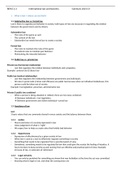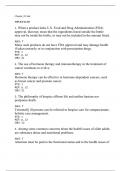Samenvatting
Detailed summary of Hospitality / International Business Law Incl. 3 EXTRA practice tests + ANSWERS
Detailed summary for the subject REHE. - The summary covers information of the book and external YouTube video's. - This summary covers the subjects 1 until 13. - Can also be used for the subjects Business law and international Law. Extra's: - Includes a puzzle of 50 keywords + descriptio...
[Meer zien]













